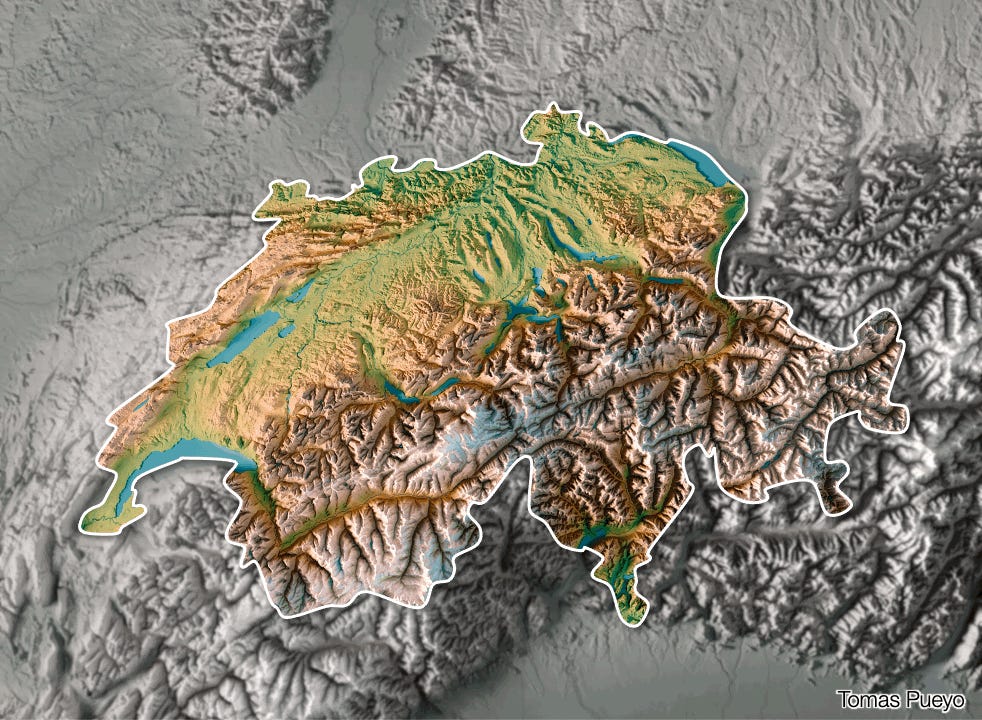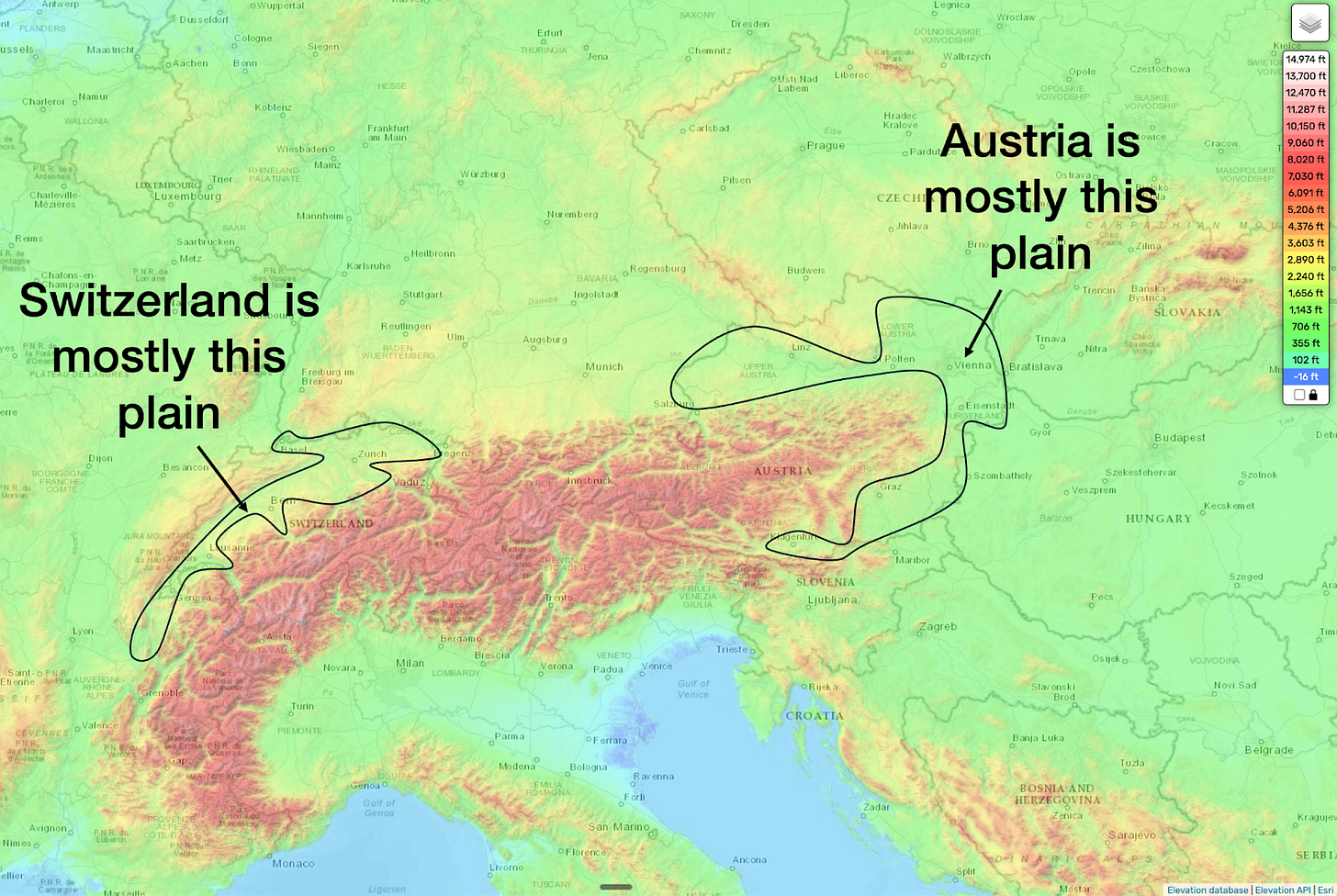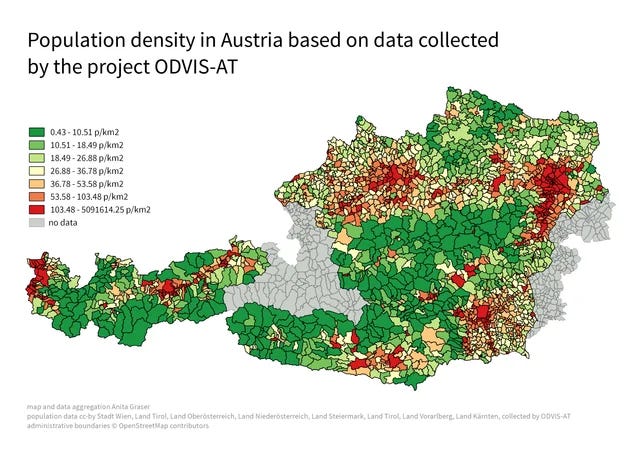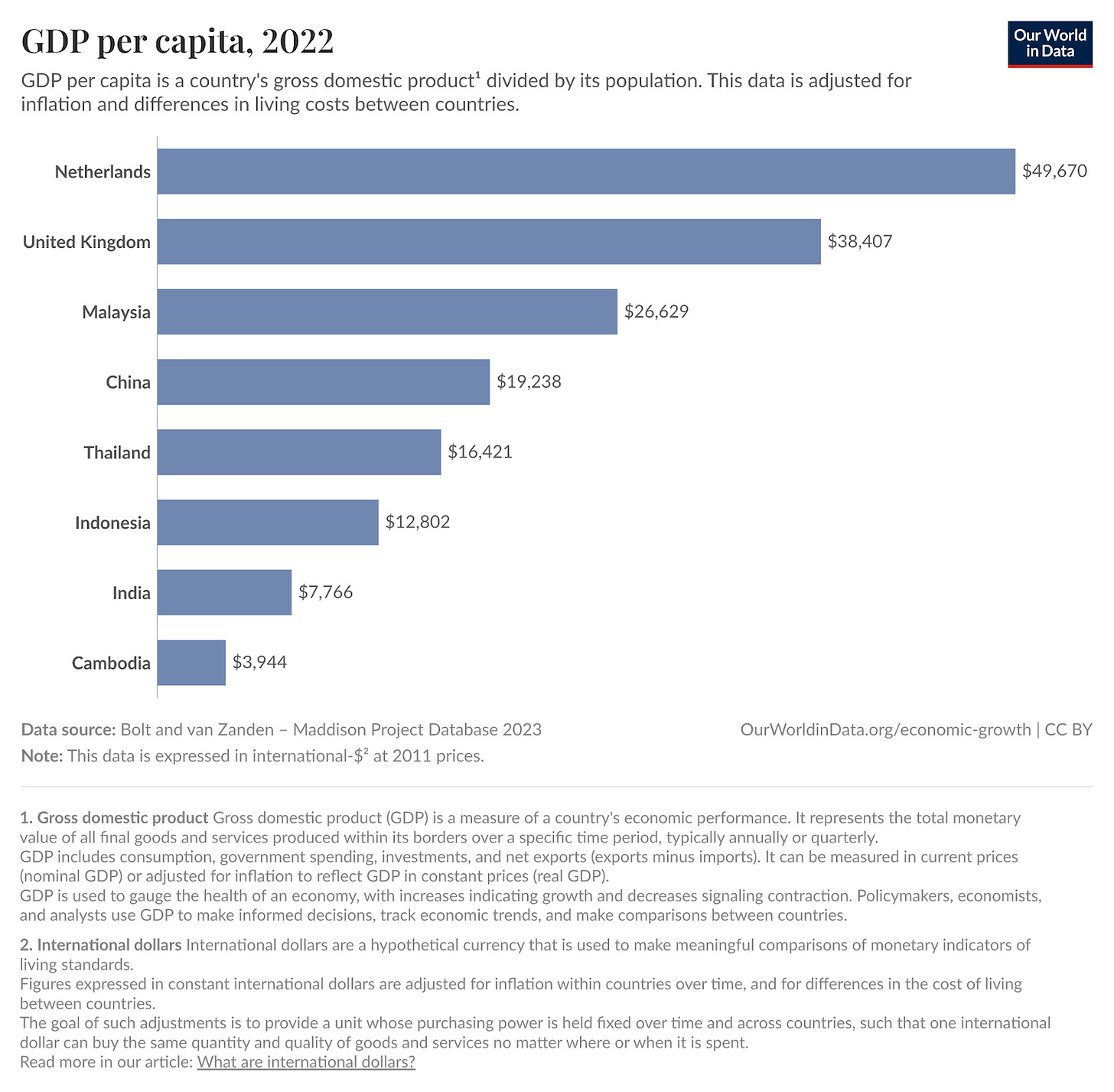Warm Countries’ Poverty & Mountains: Responses to Your Comments
In the last article, Why Warm Countries Are Poorer, I posited that mountains are the most underrated factor: A sizable share of tropical people live in the mountains, where temperatures are cooler, but this brings them high trading costs and ethnic conflict, which impoverish them. This article is now the most liked and commented article of all time in Uncharted Territories. This trove of fantastic comments have furthered the debate and illuminated new aspects, so I thought I’d address them:1
In today’s article:
Geographic arguments against the theory: Switzerland, Austria, Colorado, India, Cambodia, Indonesia, China…
Has race had any role in warm countries’ poverty?
Does this disregard colonialism?
In the premium article later this week:
More arguments against this theory
Does agriculture really matter in the 21st century?
Is this mountain thing a correlation or causation?
What other examples support the theory? Afghanistan, Papua New Guinea, Cameroon, US
Is Air Conditioning really that important?
What’s the role of institutions?
Is GDP the right metric here?
What other factors might have contributed that I haven’t mentioned yet?
Geographic Arguments Against the Theory
Switzerland
The argument is: Switzerland is mountainous, yet rich. Therefore, mountains can’t cause poverty.
Look at Switzerland: a highly mountainous country far from the tropics, yet one of the richest on Earth (GDP per capita ~$100k). Its success comes from embracing independence and decentralization—cantons with strong local governance, direct democracy, and neutrality, the opposite of centralized empires like Russia or Spain. This suggests mountains don’t inherently cause poverty; they reward federalism and bottom-up integration over top-down control.
I wrote about Switzerland here, but I haven’t written a full-length article on it yet, so very quickly:
Despite having lots of mountains, Switzerland’s inhabited area is not that high, and is extremely well connected with its neighbors:
The Swiss live on a plateau that’s not that high. Geneva is at ~500 m elevation (1400 ft), lower than Madrid.
It connects by river to Lyon in France (300 m / 900 ft). I assume the river is not naturally navigable, but the road between the two is not so difficult. From Lyon you can go to northern and southern France easily, so Geneva is well connected to both northern and southern France, and hence both the Atlantic and the Mediterranean.
Zürich (450 m/ 1350 ft) and Basel (300 m / 900 ft) are both on the Rhine water basin, and the path from them to the Rhine navigable region (the richest region in Europe) is easy. Also, to be clear, the northeastern border of Switzerland is the Rhine. The Rhine Valley is the richest region in Europe.
Switzerland is a buffer state, which has played four empires against each other for centuries (France, Germany, Italy, Austria). It leeches on them by arbitraging taxes (attracting taxpayers and tax-dodging companies from these richer countries in terms of GDP; this is why its banking sector is so big and banking secrecy was such a big deal), and by taking advantage of the fact that none of these four powers could take on Switzerland, or the other three would jump at them.
Compare this with the Himalayas: The Nepalese capital Kathmandu is at 1,500 m / 4,500 ft, and it’s surrounded by mountains that peak at 2800 m / 8500 ft. To its north, the range reaches 8,800 m / 29,000 ft, and then has thousands of square kilometers of Tibet, which is ~4,500 m / 14,000 ft high. On one side it has poor India, on the other it has what was until recently poor China. In other words, if you put Switzerland in the Himalayas, it would be poor.
Austria & Colorado
Cherry-picked examples: Switzerland, Austria, and Colorado are mountainous and wealthy. The Appalachian regions of the US were historically poor despite similar geography to rich European alpine regions. This suggests that institutional and historical factors, not geography alone, determine outcomes.
Austria’s rich region is in the plains. Vienna has an altitude of ~200 m / 600 ft and is on the Danube, one of the best navigable waterways in the world.
Colorado is high indeed, but at the feet of very tall mountains (on the piedmont), a flat area, and the path eastwards (towards the rich Mississippi) is very gentle. So communication was easy there. It then quickly built railways towards the nearby passes westward, which allowed it to emerge as a hub, e.g. the Kansas Pacific Railway.
So just to clarify: The problem is not the presence of mountains. The problem is if mountains make transportation difficult. In northern regions, usually, people might establish themselves at the feet of mountains, because they’re going to get access to mountain mining plus river transportation. Meanwhile, in equatorial countries, people will live among the mountains themselves, because there the elevation is a plus, not a minus, for cooler temperatures, less disease etc. The trade-off is that it makes transportation much more expensive and conflict.
India, Cambodia, Indonesia, China
The other big concern is the opposite: Countries like India, Cambodia, Indonesia, and China all built great empires! They were very rich.
When the Europeans started their drive to conquer about 500 years ago, India and China were the richest places on Earth.
There were several very successful Southeast Asian empires, such as Srivijaya in Sumatra, Shailendra dynasty and Majapahit in Java, or Khmer in Cambodia. All of them can be considered as ‘rich’ in their respective era, some with grandiose monuments like Angkor Wat and Borobudur. All of them existed in low land very hot places.
I would say that these empires may be successful due to maritime trade. They are located in areas full of islands, and in a half way of maritime routes between east and south Asia. I would also argue that they are as successful as European kingdoms during the European middle ages (600-1300 AD).
First, none of these countries are rich today, nor were they rich in the past, in terms of GDP per capita.
I looked at the very long term GDP per capita for these countries, plus the Netherlands and the UK. There’s not much data, but around 1850 it was ~$800 in the region ($724 for Indonesia, $860 for China, $950 for India). At that time, it was 4-5x higher in the UK and NL. In the year 1000, the UK was already richer ($1,000) than this region in 1850. Data for the Netherlands starts in 1350, at $1,400. And this is all before these regions started really accumulating wealth, which is the point of the article! Europe went down for 500 years after the fall of the Roman Empire (the Dark Ages lasted broadly from 500 AD to 1000 AD), and the Agricultural Revolution that exploded the population in Europe started around 1000 AD. Technology slowly built up from 1000 AD to 1800 AD, with an explosion afterwards. These are the critical years, and I argue that this tech and wealth explosion was hard in warm regions for the reasons I shared in the previous article.
So why did they build empires? Because as long as you have a little bit of surplus, and low transportation costs, you can conquer your neighbor and extract her wealth. So yes, the Taj Mahal and Angkor Wat and Borobudur exist, but that doesn’t mean their respective civilizations were rich on a per capita basis. They just accumulated the wealth from big populations (which are perfectly compatible with low-lying warm areas).
Note that these empires require cheap transportation costs, which access to the seas provides. Whereas mountains are poor because of expensive transportation, low-lying areas are poor despite cheap transportation, because of the warmth and moisture.
Has Race Had Any Role in Warm Countries’ Poverty?
In the original article, I stated that some people thought race also played a role in warm countries’ underdevelopment, without going further for obvious reasons: This is a viper’s nest.
Some commenters support this theory:
General intelligence, g, is well defined and understood by now.
Intelligence is also an evolutionary process. The phenomenon of a slow but steady increase in intelligence over generations is called the Flynn effect. This is something that is measured and observed around the world through standardized intelligence tests.
It’s not “race” that influences development, it’s IQ. I can’t avoid it in my life of living overseas in equatorial climates. IQ is by far the strongest predictor about future financial incomes, job performance, potential for criminality (or getting caught), and all-cause mortality. Basically about everything. Everything that matters and can be measured.
There are no actionable items. It’s obviously race. That’s why Singapore is rich and Sub-Saharan Africa is not.
Others disagree:
As far as I have learned, the construct/idea of ”race” was mostly promoted and used by politicians to support nationalism, based on weird ”research” done about 100 to 150 years ago. As far as I know, modern scientists are saying today that there is no evidence that supports the existence of ”races”. (E.g. real genetic differences are minimal, commonalities much bigger)
Race was not a thing in 350 B.C.E.; race as we understand it, is a 16th-century invention.
Let’s say that the most disturbing ideas about ‘race’ turn out to be true: e.g. that Ashkenazi Jews are more capable intellectually than non-Jews; that people of Chinese descent are better at math than others; that people of recent African descent are less capable intellectually. Even if these scary ideas *were* true (and I do not concede that they are): 1) a human’s value and right to be respected do not depend on their cognitive abilities. Anyone with a cognitively disabled or brain-damaged relative knows this in their bones. 2) People must be assessed individually and not as part of some group... Paraphrasing Noam Chomsky: What if people with blue eyes were 15% more likely to be bad at music? Only a fool would say, “Nah, don’t even apply, Mr Blue-Eyed Violinist. No audition for you.”
What do you think?
This is what I think—and since this is so contentious, and it’s not fundamental to my theory of mountains, it’s behind a paywall.






